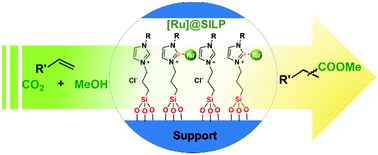Ruthenium complex immobilized on supported ionic-liquid-phase (SILP) for alkoxycarbonylation of olefins with CO2†
Abstract
In this study, the heterogeneously catalyzed alkoxycarbonylation of olefins with CO2 based on a supported ionic-liquid-phase (SILP) strategy is reported for the first time. An [Ru]@SILP catalyst was accessed by immobilization of ruthenium complex on a SILP, wherein imidazolium chloride was chemically integrated at the surface or in the channels of the silica gel support. An active Ru site was generated through reacting Ru3(CO)12 with the decorated imidazolium chloride in a proper microenvironment. Different IL films, by varying the functionality of the side chain at the imidazolium cation, were found to strongly affect the porosity, active Ru sites, and CO2 adsorption capacity of [Ru]@SILP, thereby considerably influencing its catalytic performance. The optimized [Ru]@SILP-A-2 displayed enhanced catalytic performance and prominent substrate selectivity compared to an independent homogeneous system under identical conditions. These findings provide the basis for a novel design concept for achieving both efficient and stable catalysts in the coupling of CO2 with olefins.



 Please wait while we load your content...
Please wait while we load your content...